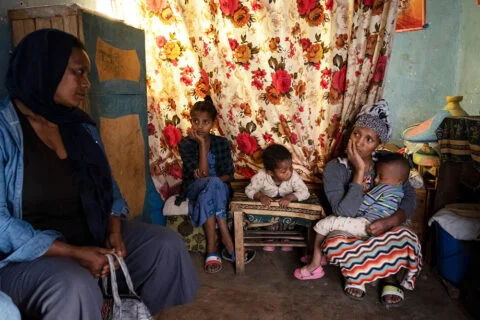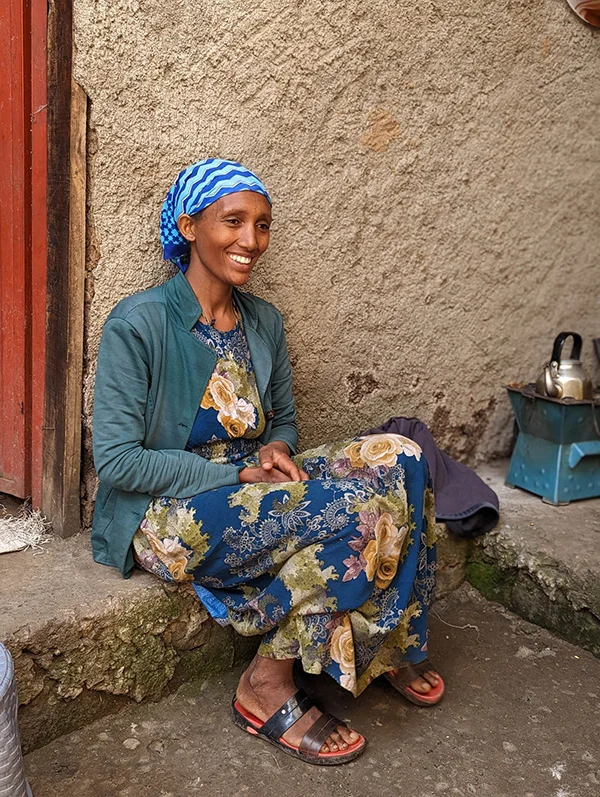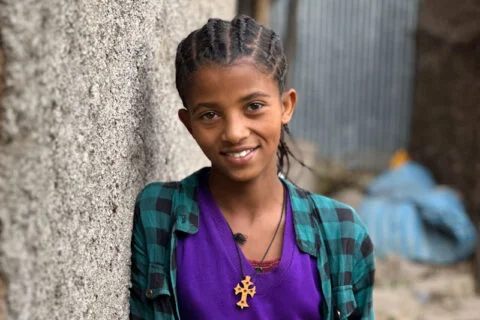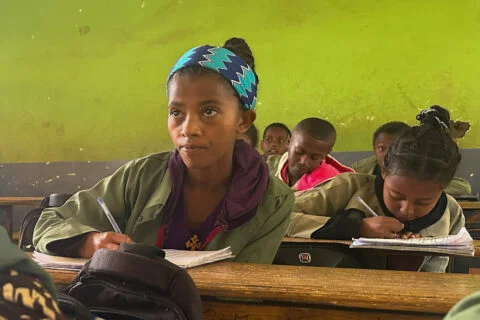There is sheer desperation in a family: what has happened? How can we help? These are our questions in spring 2022, when Menschen für Menschen becomes aware of the girl Hirut and her siblings. Today, a year and a half later, the family is happy: This is how we provide “help for self-development”.
Unwanted in your own country

The family fled the threat of violence. In the city of Debre Berhan she found safety, but also abject poverty from which there seemed to be no way out. The boy Biruk and the girl Selam are three years old. The twins are too small for their age: a result of a lack of food. Biruk sleeps on mother Sosina's lap. Her gaze is empty. Selam comes over and strokes his little brother on the head. Then the girl trips back to her big sister Hirut and cuddles up to her. Hirut is 13. She also seems too petite for her age.
The apartment for parents and four children consists of a single small room. During the day a mattress leans against the wall. Hirut and her seven-year-old sister Haymanot are sleeping on it. The parents spend the night with the twins behind a curtain.
The family has been living in the city of Debre Berhan as refugees in their own country for three years. Ethiopia is a multi-ethnic country. Politicians have long divided the ethnic groups and sowed distrust and envy. Poverty is fertile ground in which evil seeds sprout. Sosina Sisay and her husband Abush Tesfaye belong to the Amhara ethnic group and have lived in the Oromia region for a long time. Abush is a skilled construction worker; he earned his money by plastering mud houses. One day the local colleagues said: “You’re taking our work away. Go away!” The boss whispered: “The people want to kill you.” So the family fled with their two big children and newborn twins to Debre Berhan in the Amhara region of the country.

There are many plasterers in the city. If Abush can't find a job in construction in the morning, he goes to the market, where he offers himself as a porter unloading trucks. Often in vain. “When he comes home after sunset, I look at his hands,” says Sosina. “Does he have money, does he have food with him?”
In Oromia they had a small mud house. Now they have to pay rent for their accommodation, the equivalent of 18 francs a month. That's a lot of money, on a very good day Abush earns two francs. But at least twice a week he comes home empty-handed. “Then my husband and I go without food. The children get what we have. We’re skipping lunch and dinner.” The children are hungry and often ask for food. “I try to distract them, say that I’m about to cook and hope that they forget that they’re hungry,” says the mother. “But of course they don’t forget it. I go outside and cry so they don't see my pain."
She goes to the neighborhood shops and begs for food: “I’ll pay you tomorrow, for sure.” Sometimes she can have it put on a tab, sometimes not. “We are newcomers,” says Sosina. “We have no friends and no family here.”
Hirut listens to her mother. Her adult expression doesn't seem to match her age. She is one of the best students in her class and learning is easy for her. Her favorite subject is mathematics: “I love calculating and finding out the solutions.” Yes, she is often hungry, but she doesn't say so. “I don’t want to cause my mother any pain. I want my younger siblings to have the food.”
Lemlem Tadesse, a social worker at Menschen für Menschen, sits in a corner, her eyes shimmering wetly. “Of course we helpers are touched by this unintentional suffering,” she says. A neighbor had told her about the family's misery: "We want to include them in our children's project." Karlheinz Böhm's Aid to Ethiopia provides comprehensive support to 1,200 children from the poorest families in the city. Their parents are also supported with vocational training. The families should escape their lack of prospects once and for all (see box). How could that work? “We need more income to be able to pay for food and rent,” says Sosina.
“The landlord doesn’t want us because we’re behind on the rent,” confirms Hirut. “He also accuses us of needing too much electricity for the light bulb in the evening.” The father is always worried about the rent. “When I tell him: I need a notebook for school, he says: Let’s pay the rent first.”
“When the twins are older, I can work. Cooking and washing for the neighborhood,” says the mother. “Then we have enough money.” Hirut looks at the wall. You can tell she doubts whether there is a better life for her.
Confident and hopeful

A time jump of one and a half years. The children and the mother are as if they have changed: During another home visit, the visitors from Switzerland meet a happy family. How much body language says about your mental life! During the first visit, Sosina Sisay sat slumped on a stool, she only spoke short sentences, without a smile. Now not only the eyes shine, but the whole face.
“I became a merchant,” says Sosina. There is a market in Debre Berhan four days a week. “At first I sold fruit and vegetables, but a lot of them were ruined. Now I've switched to long-lasting goods: coffee, sugar, tea, incense." This means she earns the equivalent of 30 to 50 francs per week – twice to three times as much as her husband. It's enough to eat three times a day and buy pants and T-shirts for the children. The parents not only bought a bed, but also treated the children to a small, used TV for 80 francs: "Then they stay at home and don't hang out in front of the neighbors in front of the TV," explains the mother.
Sosina emphasizes that she makes decisions together with her husband, even though she now earns more. «We used to argue a lot. I complained a lot because our life was so bad. Now we'll discuss quietly what's best for the family." The couple considers their father giving up day labor and joining his wife's business. “You can earn more at the markets in the surrounding area, but I can’t transport the goods alone.” As a medium-term goal, they want to afford an apartment that doesn't just consist of one room. “I used to feel like a beggar and inferior,” says Sosina. “Now I like to get out of the house. I found friends in the neighborhood. I believe that we can work for an even better life."

For Sosina there is no doubt: “I owe everything to Lemlem.” The social worker from Menschen für Menschen not only ensured that the family received material help: first food, then school supplies and also hygiene products. Above all, Lemlem Tadesse ensured that Sosina joined other women in similar situations in a self-help group. There the women received training in starting and running a small business. Then Sosina received her first microcredit for the equivalent of 80 francs from Ethiopia Aid to start her small business - she was able to quickly repay the loan. But it wasn't just the technical knowledge and start-up capital that were important, but also the psychological support: "In some weeks, Lemlem visited me every day to give me hope."
“Women lack self-confidence. They are very afraid of taking out their own initiatives and taking out microloans because they fear not being able to pay the money back,” explains social worker Lemlem Tadesse. «We are trying to allay their fears. For example, by bringing them together with other women who have already successfully completed our microcredit program.” And Hirut? “Without Menschen für Menschen, I would have had to drop out of school,” says the now 14-year-old, who has grown many centimeters in the past year and a half. “I remember how the principal sent me home because my parents didn’t have money for a school uniform.” Her mother asked for an appointment and begged the teacher to teach Hirut without a uniform. The memory of this shadows Hirut's face. But then it brightens again. She is still one of the best students in the class. “I want to study medicine!” she says of her dream.
She often sees parents with children who live on the streets and sleep outside at churches - desperately poor immigrants from the countryside who hope to have a better life in the city. “If they get sick, no one is there to help them,” says Hirut. That's why she wants to become a doctor. “I ask myself: What would it be like to be in her position? Then I think: You're very lucky that you're feeling better! That's why I want to help them."
Many families in the city of Debre Berhan are extremely poor. There is no money for school supplies and there is a lack of food in the cramped accommodations. We support 1,200 particularly needy children and their families. Our concept is “help for self-development”. The families should be able to stand on their own two feet as quickly as possible so that we can give other families prospects.
WHAT WE DO
Some of our activities:
- When school started in September, 1,128 children and young people received uniforms, pens and notebooks - every child has the right to go to school!
- The families have no money for sanitary pads. Many girls don't go to school during their period. Some drop out of school altogether. We provide sanitary pads to 150 girls.
- The living situation is often not humane. We build social housing using traditional clay construction methods. Currently 90 apartments have been completed or are under construction.
- We train parents, especially mothers, in self-help groups. 400 of them receive microcredits of 80 to 200 francs to start a small business.
WHAT WE ACHIEVE
We can usually release families into self-employment after three years. They have prospects and can now lead a humane life independently of outside help. In their place, we include other needy families in the project.






